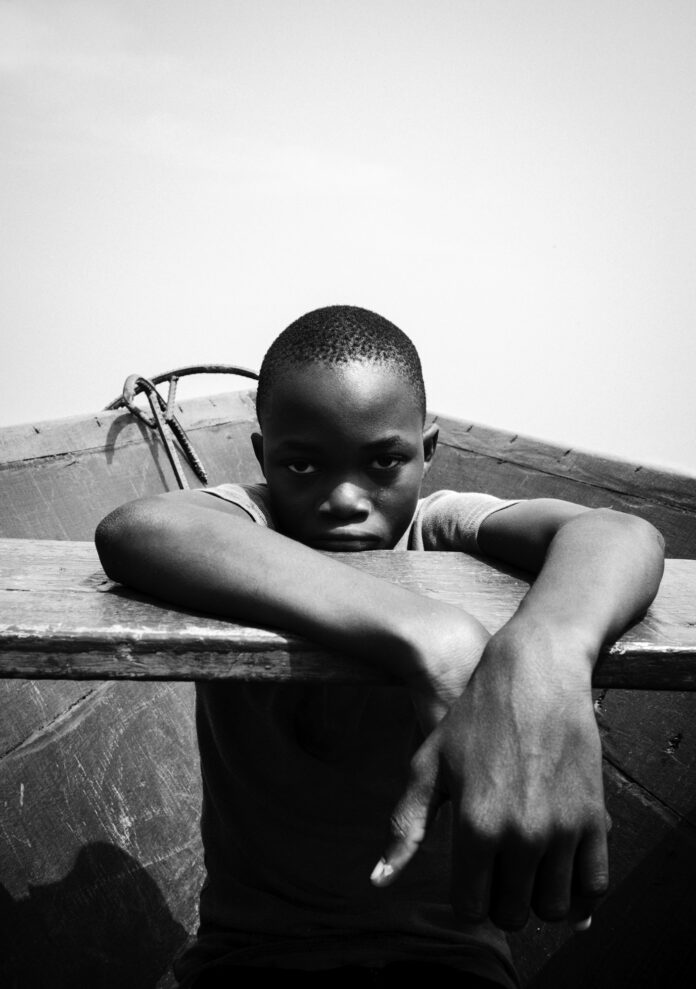Before the Law. Narmer’s Tenth Parable.
A gatekeeper of the law, in a seafaring canoe, approaches a man sitting under his coconut tree on his village beach. The gatekeeper of the law asks the main if he would like to gain entry into the law. The man replies, “Maybe, I would like to gain entry into the law someday. But not now.” The gatekeeper of the law retorts, “Why not now? Everyone is happier if you gain entry into the law as well.”
The man sitting on his woven mat, under his coconut tree, on the beautiful sands of his village shores, turns around to see, for the first time in this conversation, what this gatekeeper of the law looked like. For the first time he beheld the pale face of the gatekeeper of the law—the long Tartar beard, the large pointed nose, the tiny, thin, lips and the glassy eyes. The man reasoned to himself, that if it made everyone around happier, and if the law was measured, he was willing to gain entry into the law. The man made his intentions clear to the gatekeeper of the law.
The gatekeeper of the law insisted, “If the law does not appeal to you, try it in spite of your reservations. But let me inspire you: I am powerful and very appealing, and I am the lowest ranked gatekeeper. From canoe to canoe, from ship to ship, there are gatekeepers, each more powerful and more appealing than the other. I can’t tell you how appealing the third gatekeeper is, so much so that I am unable to even describe the feeling of his powerful appeal.”
The man sitting on his woven mat, under his coconut tree, on the beautiful sandy beaches of his village, had not heard of anything so appealing and more powerful. How come in all his seafaring and fishing days, he had not come across any such appeal? How come no one in his village—not his parents, not his brothers and sisters—had told him about the gatekeeper of the law, and about the law? The man reasoned to himself that if the law was so appealing then it must be appealing to everyone, and everyone must have desired the law.
The gatekeeper of the law gave the man a seat in the canoe, the best seat looking at sea, away from the beautiful sandy beaches of the man’s village. There, the man sat, for days, as the canoe skittled on from sea to sea, from ocean to ocean, for days and years. The man made many attempts to be let near and into the next big canoe, and unto the next ship, where he could eventually behold the face of the law.
The gatekeeper of the law interrogated the man briefly each and every time the man asked to see the law. The gatekeeper questioned the man about his village and many other things about his village people, their culture, their languages and the religions. But these questions were indifferent questions, skillfully tailored to prolong conversation, the kind that cunning minds put together, and at the end of each one of these questions, the gatekeeper told the man once more than he could not let him inside the next big canoe, or ship, yet.
The man, who had equipped himself with many things from his village for the voyage, spent everything no matter how valuable they were, by giving them to the gatekeeper, in order to gain entry into the law. The gatekeeper took everything the man offered—the man’s woven mat, his sandals, his clothes, his coconuts, etc.—and as he emptied the man’s pockets, he did so with the speech, “I am taking this only so that you do not think that you failed to do anything.”
In the many years since the man had been on the canoe, he observed the gatekeeper almost continuously. He simply forgot about the other supposed gatekeepers, since, he thought to himself, the only way to gain entry into the next big canoe, is to appeal to this gatekeeper to take him closer to the next big canoe, and so on until he came face to face with the law. This gatekeeper hence was the first obstacle for entry into the law.
The man grew exhausted, disappointed, and furious. He cursed his unlucky circumstance, not the gatekeeper. In the beginning of his voyage, he cursed himself aloud without even the fear of making the gatekeeper dislike him. Later, as the man grew older, he mumbled to himself the same curses. He became childish. In the decades that he spent studying the gatekeeper, the man came to notice the fishes down below, in the oceans—the background to the gatekeeper’s canoe. The man would even ask the fishes in the seas, which would swim by every now and then, to help him persuade the gatekeeper.
Finally the man’s eyesight became too weak for him to see anything in front of him. He could no longer see even the fishes he had come to both admire and befriend. But, inside the Darkness of his lost sight, inside the darkest parts of his deep vision, the man recognized the enlightenment. The darkness had given rise to a deeper insight—the gateway to the law. Although, now, the man no longer had much time to live. Before the man’s death he put together all his lived experiences, from the beautiful sandy evenings on his woven mat in his wonderful village to the time of his dying, and crafted one question which he had not yet put to the gatekeeper. He waved to the gatekeeper to come closer and closer to his lips since the man was too weak to stand upright.
The gatekeeper bent down to listen to what the man had to ask, yet again. The voyage had changed things to the disadvantage of the man. “What do you still want to know from me, old man?” asked the gatekeeper of the law. The man replied: “You are insatiable. Everyone strives after the law?” The gatekeeper nodded. The man continued: “So how is that in these many decades since I have known you, no one except me has been on this canoe with you, and we have yet to see any other canoe with a gatekeeper in it?” The gatekeeper saw that the man was already dying and, in order to reach his diminishing sense of hearing, he shouted at the man, “On this canoe, you can no longer gain entry into the beautiful sandy beaches of the village, since putting you on this canoe was the only way to get you off the land. The law was assigned only to you, I am going to take it now.”
The man summoned all his last breathe in an emphatic retort to the gatekeeper of the law: “You are no better than a cunning dog. You are Ayevu.”











Would make a short screen play ,film,to enlighten the Struggle
Who knows someone like Spike Lee might develop it and make it -or our homegrown directors who pay homage each year to the Ouagadougou film fest
Cunning dog ?
Stockholm Syndrome…
My ancestors, the Anlo-Ewes of Africa, took time to study the Caucasian and concluded, on the evidence, that he is not only a dog but a cunning one at that. “Ayevu”: singular for Cunning dog. “Ayevuwo”: plural for Cunning dogs. Growing up, and as a keeper of dogs myself, l have come into the appreciation that the description is apt for reasons as follows:
1. As is characteristic of a dog, if you grant it a home and food, it will show initial humility in order to gain your confidence.
2. A dog’s humility is not necessarily drawn on true friendship, but more on opportunism. In other words, for so long as food and home are provided friendship is maintainable without more.
3. While the alleged friendship subsists a dog would not, except for its original family members, tolerate or suffer any other dog(s) to equally make your friendship. The reason is to have uncontested control over your food and home.
4. Occasionally, a dog will bark to remind you that it is always a dog and, therefore, unpredictable.
5. A dog may finally abandon its master if there is no more free food for feeding.
6. A dog can easily re-locate, and live with others, if your food supplies run out.
7. A dog can turn about to bark, bite or attack you if it finds a new master for itself.
The foregoing are just general characteristics of dogs, but my ancestors found that the Caucasian is not just a general dog, but a unique one: cunning dog. This is because unlike the ordinary dog who would abandon you, upon a “good” ground, the Caucasian will do so for personal interest and secretly arrange your funeral before you die. It is also the reason why the Akans of Africa refer to the Caucasian as “broni” meaning a person who creates trouble, problem or pain for others. Every analogy in this write-up can be supported with numerous empirical evidence even in our modern world.
Dr. Amenuti, the man in the canoe, with the so-called gatekeeper, left some of his children behind in the beautiful village. They will learn from his tragedy and be wise. They will “gain entry into the law.”
Beautiful and insightful story.
In Twi, also, “Me Broni,” does not mean ‘My lovely one.’ It means ‘My trouble maker.’
Narmer Amenuti Abro ni meaning the wicked one.
Nana Krobea Asante Kotoko
Abro means waterbody (river, ocean, lake).
Bono Ahafo actually means Abro-Ano ne Ahafo — referring to Rivers and Forests region.
Abrofo meant wicked people.
In Twi, “Abro” also means “trouble”.
I also know “bro” means the cloud. When our forefathers saw the boats coming from the seashore, they said look, people are coming from “Bro no akyi” hence “Aburokyire”. Someone from “Bro Akyi” is “Obroni” with plural “Abrofo”.
Bro actually doesn’t mean trouble but it’s cloud in Akan. Thank you.
Narmer Amenuti Oh I get ur point: I think u r referring to a corrupted form of “abr)”, which means malice or wickedness. In that case, you may have a point here. But I haven’t heard of this potential transformation from abr) to obro. I will hv to find out. Its interesting and curious though. I will get back on this.
Abrɔ in Twi means malice and also horizon. Abrokyire means “behind the horizon”. Abrofo, I was told, means those from the horizon.
They were collectively called “abrɔfo” in Twi because of their wicked and evil nature.
The root word “abrɔ/aborɔ” means wickedness..
“obrɔni” is the singular.
The evolution of the word to it’s current connotation of endearment is a fairly recent post colonial one where it refers basically to their skin colour and supposed beauty.
Bro/brɔ=horizon
Obroni=one from the horizon
Abrobɛ=abɛ from the horizon
San/Sae/ɛsae/: abrosae=ɛsae typical of the people from the horizon.
Note:
Brɔferɛ = ɛferɛ brought down by the people of the horizon
Abrɔkyire=beyond the horizon.
Opanyin Agyekum of the UoG, Linguistics Dept. has more on this